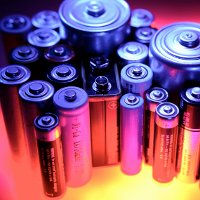
Jakarta, What do you do with old batteries? Almost all will answer, throw it into the trash. Used batteries is extremely dangerous waste which actually should not be carelessly discarded.
All types of batteries used as a remote batteries, toys, watches, cell phones, digital cameras and batteries that can be charged (rechargeable) B3 waste (hazardous and toxic materials).
If not carelessly discarded or recycled, then the content of heavy metals and other hazardous substances in batteries can pollute water and soil, which in turn harm the human body.
Environmental expert Dr R Budi Haryanto admitted reasonable if many people who do not know how to safely dispose of used batteries. Because it is so far not been there socializing how to treat other types of waste.
According to him, it is very difficult to make people aware of how to dispose of hazardous waste if the government did not give examples.
"Almost all people are not aware because they do not know the danger, so dispose of used batteries in just like that," said Dr R Budi Haryanto as Chairman of the Department of Environmental Health detikHealth FKM UI when contacted on Thursday (3/17/2011).
Dr. Budi said one of the key is to disseminate on this matter to the people that used batteries are dangerous, so the handling is more comprehensive. If not socialized then the public will not know and do not manage the waste properly.
Why not be disposed of used batteries carelessly?
Batteries contain various heavy metals such as mercury, manganese, lead, nickel, lithium and cadmium.
If the batteries are carelessly discarded the heavy metals contained in them will pollute groundwater and endanger the health of the population.
Dr. Budi revealed that heavy metal contaminated water is used by the community can lead to chronic disease that will cause interference in the central nervous system, kidneys, reproductive system and even cancer.
"The effect is long term. And usually the new society will be more concerned if the effects that arise in the near term," said the lecturer, who was born in Malang FKM 51 years ago.
How to manage the waste of used batteries?
Should the old battery waste is managed specifically and separately from other garbage.
Existing technology is the B3 waste will be dumped in the soil that already contains other chemicals to be neutralized and destroyed so as not to pollute the environment.
"To overcome this B3 waste everyone should be aware in advance, either from the community, waste management and also the government because of these complex issues. Usually only people who truly know who did this," he said.
What is the danger of used batteries?
Waste batteries not only causes pollution but also endanger the natural resources they contain heavy metals and corrosive electrolyte into the battery power source, such as lead, mercury, nickel, cadmium, lithium, silver, zinc and manganese
In the action of microorganisms, inorganic mercury can be transformed into methylmercury, fish congregate in the body which is then consumed by humans. Methylmercury can enter brain cells and have serious consequences such as damage to the nervous system that can make people mad or even cause death.
While cadmium batteries can contaminate soil and water, which eventually enter the human body causing liver and kidney damage, can also cause soft bones or severe bone defects.
In addition, cadmium can cause chronic poisoning and be a factor causing emphysema (disease
chronic obstructive pulmonary disease that involves damage to air sacs in the lungs), osteomalacia (softening of bones), anemia (lack of blood), also create paralysis in the human body.
Excretion of lead is also the most difficult in the human body and can interfere with kidney function and reproductive function.
If a battery waste mixed with other solid waste, from time to time harmful content therein can contaminate water and soil, which then threatened the life of fish, plants, environmental destruction and indirectly threaten human health.
Why waste hard to familiarize citizens with the right battery?
According to Dr Budi hard familiarize people dispose of waste batteries safe because it requires great effort. There should be a special facility that houses and people who do it.
For example, if collected per RT, then who will send to its B3 waste processing center. This condition is related to how far away and how much it costs to be incurred.
Yet Dr. Budi said there are several things you can do the community to reduce the adverse effects of sewage pollution of used batteries, namely:
1. Communities must be socialized in advance about the dangers of waste B3 for health
2. Begin to separate hazardous waste such as used batteries at home by putting it in a special plastic and other debris separated
3. Collect all hazardous waste materials in certain places, such as RW in each one there is one special place to accommodate the temporary hazardous waste
4. When the manager came to pick up trash they should also already have the awareness to not mix hazardous waste with other waste
5. After that the B3 waste will be sent to the B3 waste handlers who already meet the standards.
Because of this socialization on the dangers of B3 waste is very important to sensitize the public to dispose of used batteries should not arbitrarily so as not to pollute the environment which could have a negative impact on health.
Place dispose of waste batteries?
In some developed countries do battery recycling very seriously. Many countries in Western Europe, not only in stores but also directly on the road, equipped with a special battery recycling box and use the materials recycle 95 percent, especially in high-value metal recovery.
Tidak ada komentar:
Posting Komentar